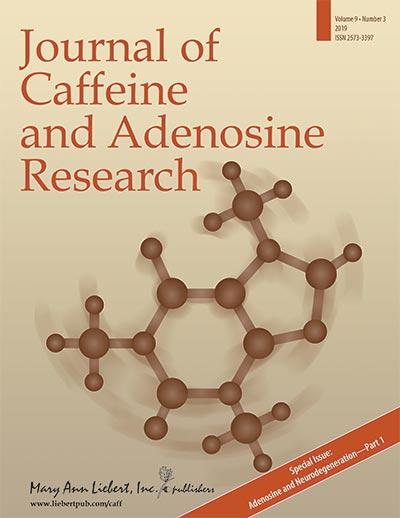
Credit: Mary Ann Liebert, Inc publishers
New Rochelle, NY, December 6, 2019 -The role of adenosine in neurodegeneration and neuroregeneration has led to growing attention on adenosine receptors as potential drug targets in a range of brain disorders, including neuroregenerative therapy and treatment for amyotrophyic lateral sclerosis (ALS). These are just two areas of focus in the upcoming special issue on Adenosine and Neurodegeneration – Part II published in Journal of Caffeine and Adenosine Research, a peer-reviewed journal from Mary Ann Liebert, Inc., publishers. Visit the Journal of Caffeine and Adenosine Research website to read the articles free until January 6, 2020.
Guest Editor David Blum, University of Lille, Inserm, has compiled a wide-ranging collection of articles on the emerging role of adenosine and neurodegeneration and the implications it has for therapeutic drug development.
Sara Xapelli, PhD, Universidade de Lisboa (Portugal), Ricardo Rodrigues, PhD, University of Coimbra (Portugal), and colleagues coauthored an article entitled “Neurogenesis and Gliogenesis: Relevance of Adenosine for Neuroregeneration in Brain Disorders.” In this article the authors review the current understanding of the role of adenosine and caffeine as modulators of neuronal activity and as potential targets for the formation of new neurons and oligodendrocytes. They consider these concepts in the setting of their relevance to brain regeneration.
Ana Sebastião, Universidade de Lisboa (Portugal), Yijuang Chern, PhD, Academia Sinica (Taipei, Taiwan) and colleagues coauthored the article entitled “Adenosine and its Receptors as Potential Drug Targets in Amyotrophic Lateral Sclerosis.” The researchers review the growing body of evidence showing changes in adenosine metabolism and adenosine receptor function as ALS develops and progresses. They discuss how adenosine homeostasis and adenosine receptors are altered in ALS patients and experimental models of ALS, and the potential for targeting these factors as drug targets.
“These authoritative reviews will help our quest to increase awareness of the fundamental role of adenosine for the normal brain development and function as well as in the pathogenesis of neuropsychiatric disorders,” says Editor-in-Chief of Journal of Caffeine and Adenosine Research Sergi Ferré, MD, PhD, Chief of the Integrative Neurobiology Section at the National Institute on Drug Abuse, National Institutes of Health, Baltimore, MD.
###
About the Journal
Journal of Caffeine and Adenosine Research is the first and only journal dedicated to the rapidly advancing field of caffeine and adenosine signaling research. Published quarterly in print and online and led by Sergi Ferré, MD, PhD, Integrative Neurobiology Section, National Institute on Drug Abuse, National Institutes of Health (Baltimore, MD), the Journal addresses the need for an authoritative source on caffeine and adenosine’s role in biological processes. The Journal encompasses all aspects of adenosine, from the molecular structure and function of receptors, enzymes, and transporters, to the biochemistry, physiology, and pharmacology of adenosine signaling; from the physiological role of adenosine in neuromodulation, inflammation, and innate immunity, to its pathophysiological role in neuropsychiatric disorders and cancer. Tables of content and a sample issue may be viewed on the Journal of Caffeine and Adenosine Research website.
About the Publisher
Mary Ann Liebert, Inc., publishers is a privately held, fully integrated media company known for establishing authoritative peer-reviewed journals in many promising areas of science and biomedical research, including Cannabis and Cannabinoid Research, Journal of Medicinal Food, and Journal of Women’s Health. Its biotechnology trade magazine, GEN (Genetic Engineering & Biotechnology News), was the first in its field and is today the industry’s most widely read publication worldwide. A complete list of the firm’s 80 journals, books, and newsmagazines is available on the Mary Ann Liebert, Inc., publishers website.
Media Contact
Kathryn Ryan
@LiebertPub
914-740-2250
Original Source
https:/
Related Journal Article
http://dx.




